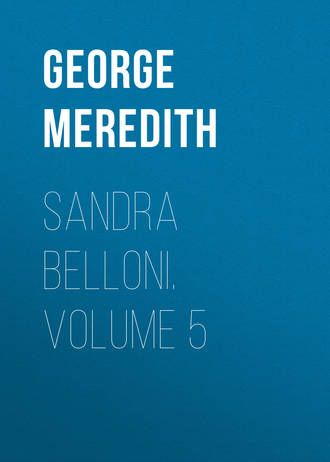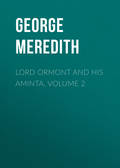
George Meredith
Sandra Belloni. Volume 5
Marini and Emilia laughed. While Sir Purcell was maintaining the fact of his total ignorance of the subject against Madame's incredulity, Emilia left the room. When she came back Madame was pressing her visitor to be explicit with regard to a certain process of cure conducted by an application of cold water. The Neapolitan gave several shudders as she marked him attentively. "Water cold!" she murmured with the deepest pathos, and dropped her face in her hands with narrowed shoulders. Emilia held a letter over to Sir Purcell. He took it, first assuring himself that Marini was in complicity with them. To Marini Emilia addressed a Momus forefinger, and Marini shrugged, smiling. "Water cold!" ejaculated Madame, showing her countenance again. "In winter! Luigi, they are mad!" Marini poked the fire briskly, for his sensations entirely sided with his wife.
The letter Sir Purcell held contained these words:
"Be kind, and meet me to-morrow at ten in the morning, at that place where you first saw me sitting. I want you to take me to one who will help me. I cannot lose time any more. I must work. I have been dead for I cannot say how long. I know you will come.
"I am, for ever,
"Your thankful friend,
"Emilia."
CHAPTER XXXIX
The pride of punctuality brought Sir Purcell to that appointed seat in the gardens about a minute in advance of Emilia. She came hurrying up to him with three fingers over her lips. The morning was cold; frost edged the flat brown chestnut and beech leaves lying about on rimy grass; so at first he made no remark on her evident unwillingness to open her mouth, but a feverish look of her eyes touched him with some kindly alarm for her.
"You should not have come out, if you think you are in any danger," he said.
"Not if we walk fast," she replied, in a visibly-controlled excitement.
"It will be over in an hour. This way."
She led the marvelling gentleman toward the row, and across it under the big black elms, begging him to walk faster. To accommodate her, he suggested, that if they had any distance to go, they might ride, and after a short calculating hesitation, she consented, letting him know that she would tell him on what expedition she was bound whilst they were riding. The accompaniment of the wheels, however, necessitated a higher pitch of her voice, which apparently caused her to suffer from a contraction of the throat, for she remained silent, with a discouraged aspect, her full brown eyes showing as in a sombre meditation beneath the thick brows. The direction had been given to the City. On they went with the torrent, and were presently engulfed in fog. The roar grew muffled, phantoms poured along the pavement, yellow beamless lights were in the shop-windows, all the vehicles went at a slow march.
"It looks as if Business were attending its own obsequies," said Sir Purcell, whose spirits were enlivened by an atmosphere that confirmed his impression of things.
Emilia cried twice: "Oh! what cruel weather!" Her eyelids blinked, either with anger or in misery.
They were set down a little beyond the Bank, and when they turned from the cabman, Sir Purcell was warm in his offer of his arm to her, for he had seen her wistfully touching what money she had in her pocket, and approved her natural good breeding in allowing it to pass unmentioned.
"Now," he said, "I must know what you want to do."
"A quiet place! there is no quiet place in this City," said Emilia fretfully.
A gentleman passing took off his hat, saying, with City politeness, "Pardon me: you are close to a quiet place. Through that door, and the hall, you will find a garden, where you will hear London as if it sounded fifty miles off."
He bowed and retired, and the two (Emilia thankful, Sir Purcell tending to anger), following his indication, soon found themselves in a most perfect retreat, the solitude of which they had the misfortune, however, of destroying for another, and a scared, couple.
Here Emilia said: "I have determined to go to Italy at once. Mr. Pericles has offered to pay for me. It's my father's wish. And—and I cannot wait and feel like a beggar. I must go. I shall always love England—don't fear that!"
Sir Purcell smiled at the simplicity of her pleading look.
"Now, I want to know where to find Mr. Pericles," she pursued. "And if you will come to him with me! He is sure to be very angry—I thought you might protect me from that. But when he hears that I am really going at last—at once!—he can laugh sometimes! you will see him rub his hands."
"I must enquire where his chambers are to be found," said Sir Purcell.
"Oh! anybody in the City must know him, because he is so rich." Emilia coughed. "This fog kills me. Pray make haste. Dear friend, I trouble you very much, but I want to get away from this. I can hardly breathe. I shall have no heart for my task, if I don't see him soon."
"Wait for me, then," said Sir Purcell; "you cannot wait in a better place. And I must entreat you to be careful." He half alluded to the adjustment of her shawl, and to anything else, as far as she might choose to apprehend him. Her dexterity in tossing him the letter, unseen by Madame Marini, might have frightened him and given him a dread, that albeit woman, there was germ of wickedness in her.
This pained him acutely, for he never forgot that she had been the means of his introduction to Cornelia, from whom he could not wholly dissociate her: and the idea that any prospective shred of impurity hung about one who had even looked on his beloved, was utter anguish to the keen sentimentalist. "Be very careful," he would have repeated, but that he had a warning sense of the ludicrous, and Emilia's large eyes when they fixed calmly on a face were not of a flighty east She stood, too, with the "dignity of sadness," as he was pleased to phrase it.
"She must be safe here," he said to himself. And yet, upon reflection, he decided not to leave her, peremptorily informing her to that effect. Emilia took his arm, and as they were passing through the hall of entrance they met the same gentleman who had directed them to the spot of quiet. Both she and Sir Purcell heard him say to a companion: "There she is." A deep glow covered Emilia's face. "Do they know you?" asked Sir Purcell. "No," she said: and then he turned, but the couple had gone on.
"That deserves chastisement," he muttered. Briefly telling her to wait, he pursued them. Emilia was standing in the gateway, not at all comprehending why she was alone. "Sandra Belloni!" struck her ear. Looking forward she perceived a hand and a head gesticulating from a cab- window. She sprang out into the street, and instantly the hand clenched and the head glared savagely. It was Mr. Pericles himself, in travelling costume.
"I am your fool?" he began, overbearing Emilia's most irritating "How are you?" and "Are you quite well?
"I am your fool? hein? You send me to Paris! to Geneve! I go over Lago
Maggiore, and aha! it is your joke, meess! I juste return. Oh capital!
At Milano I wait—I enquire—till a letter from old Belloni, and I learn
I am your fool—of you all! Jomp in."
"A gentleman is coming," said Emilia, by no means intimidated, though the forehead of Mr. Pericles looked portentous. "He was bringing me to you."
"Zen, jomp in!" cried Mr. Pericles.
Here Sir Purcell came up.
Emilia said softly: "Mr. Pericles."
There was the form of a bow of moderate recognition between them, but other hats were off to Emilia. The two gentlemen who had offended Sir Purcell had insisted, on learning the nature of their offence, that they had a right to present their regrets to the lady in person, and beg an excuse from her lips. Sir Purcell stood white with a futile effort at self-control, as one of them, preluding "Pardon me," said: "I had the misfortune to remark to my friend, as I passed you, 'There she is.' May I, indeed, ask your pardon? My friend is an artist. I met him after I had first seen you. He, at least, does not think foolish my recommendation to him that he should look on you at all hazards. Let me petition you to overlook the impertinence."
"I think, gentlemen, you have now made the most of the advantage my folly, in supposing you would regret or apologize fittingly for an impropriety, has given you," interposed Sir Purcell.
His new and superior tone (for he had previously lost his temper and spoken with a silly vehemence) caused them to hesitate. One begged the word of pardon from Emilia to cover his retreat. She gave it with an air of thorough-bred repose, saying, "I willingly pardon you," and looking at them no more, whereupon they vanished. Ten minutes later, Emilia and Sir Purcell were in the chambers of Mr. Pericles.
The Greek had done nothing but grin obnoxiously to every word spoken on the way, drawing his hand down across his jaw, to efface the hard pale wrinkles, and eyeing Emilia's cavalier with his shrewdest suspicious look.
"You will excuse,"—he pointed to the confusion of the room they were in, and the heap of unopened letters,—"I am from ze Continent; I do not expect ze pleasure. A seat?"
Mr. Pericles handed chairs to his visitors.
"It is a climate, is it not," he resumed.
Emilia said a word, and he snapped at her, immediately adding, "Hein?
Ah! so!" with a charming urbanity.
"How lucky that we should meet you," exclaimed Emilia. "We were just coming to you—to find out, I mean, where you were, and call on you."
"Ough! do not tell me lies," said Mr. Pericles, clasping the hollow of his cheeks between thumb and forefinger.
"Allow me to assure you that what Miss Belloni has said is perfectly correct," Sir Purcell remarked.
Mr. Pericles gave a short bow. "It is ze same; I am much obliged."
"And you have just come from Italy?" said Emilia.
"Where you did me ze favour to send me, it is true. Sanks!"
"Oh, what a difference between Italy and this!" Emilia turned her face to the mottled yellow windows.
"Many sanks," repeated Mr. Pericles, after which the three continued silent for a time.
At last Emilia said, bluntly, "I have come to ask you to take me to
Italy."
Mr. Pericles made no sign, but Sir Purcell leaned forward to her with a gaze of astonishment, almost of horror.
"Will you take me?" persisted Emilia.
Still the sullen Greek refused either to look at her or to answer.
"Because I am ready to go," she went on. "I want to go at once; to-day, if you like. I am getting too old to waste an hour."
Mr. Pericles uncrossed his legs, ejaculating, "What a fog! Ah!" and that was all. He rose, and went to a cupboard.
Sir Purcell murmured hurriedly in Emilia's ear, "Have you considered what you've been saying?"
"Yes, yes. It is only a journey," Emilia replied, in a like tone.
"A journey!"
"My father wishes it."
"Your mother?"
"Hush! I intend to make him take the Madre with me."
She designated Mr. Pericles, who had poured into a small liqueur glass some green Chartreuse, smelling strong of pines. His visitors declined to eject the London fog by this aid of the mountain monks, and Mr. Pericles warmed himself alone.
"You are wiz old Belloni," he called out.
"I am not staying with my father," said Emilia.
"Where?" Mr. Pericles shed a baleful glance on Sir Purcell.
"I am staying with Signor Marini."
"Servente!" Mr. Pericles ducked his head quite low, while his hand swept the floor with an imaginary cap. Malice had lighted up his features, and finding, after the first burst of sarcasm, that it was vain to indulge it toward an absent person, he altered his style. "Look," he cried to Emilia, "it is Marini stops you and old Belloni—a conspirator, aha! Is it for an artist to conspire, and be carbonaro, and kiss books, and, mon Dieu! bon! it is Marini plays me zis trick. I mark him. I mark him, I say! He is paid by young Pole. I hold zat family in my hand, I say! So I go to be met by you, and on I go to Italy. I get a letter at Milano,– "Marini stop me at Dover," signed "Giuseppe Belloni." Ze letter have been spied into by ze Austrians. I am watched—I am dogged—I am imprisoned—I am examined. 'You know zis Giuseppe Belloni? 'Meine Herrn! he was to come. I leave word at Paris for him, at Geneve, at Stresa, to bring his daughter to ze Conservatoire, for which I pay. She has a voice—or she had.'"
"Has!" exclaimed Emilia.
"Had!" Mr. Pericles repeated.
"She has!"
"Zen sing!" with which thunder of command, Mr. Pericles gave up his vindictive narration of the points of his injuries sustained, and, pitching into a chair, pressed his fingers to his temples, frowning attention. His eyes were on the floor. Presently he glanced up, and saw Emilia's chest rising quickly. No voice issued.
"It is to commence," cried Mr. Pericles. "Hein! now sing."
Emilia laid her hand under her throat. "Not now! Oh, not now! When you have told me what those Austrians did to you. I want to hear; I am very anxious to hear. And what they said of my father. How could he have come to Milan without a passport? He had only a passport to Paris."
"And at Paris I leave instructions for ze procuration of a passport over
Lombardy. Am I not Antonio Pericles Agriolopoulos? Sing, I say!"
"Ah, but what voices you must have heard in Italy," said Emilia softly.
"I am afraid to sing after them. Si: I dare not."
She panted, little in keeping with the cajolery of her tones, but she had got Mr. Pericles upon a theme serious to his mind.
"Not a voice! not one!" he cried, stamping his foot. "All is French. I go twice wizin six monz, and if I go to a goose-yard I hear better. Oh, yes! it is tune—"ta-ta-ta—ti-ti-ti—to!" and of ze heart—where is zat? Mon Dieu! I despair. I see music go dead. Let me hear you, Sandra."
His enthusiasm had always affected Emilia, and painfully since her love had given her a consciousness of infidelity to her Art, but now the pathetic appeal to her took away her strength, and tears rose in her eyes at the thought of his faith in her. His repetition of her name—the 'Sandra' being uttered with unwonted softness—plunged her into a fit of weeping.
"Ah!" Mr. Pericles shouted. "See what she has come to!" and he walked two or three paces off to turn upon her spitefully. "she will be vapeurs, nerfs, I know not! when it wants a physique of a saint! Sandra Belloni," he added, gravely, "lift up ze head! Sing, 'Sempre al tuo santo nome.'"
Emilia checked her tears. His hand being raised to beat time, she could not withstand the signal. "Sempre;"—there came two struggling notes, to which another clung, shuddering like two creatures on the deeps.
She stopped; herself oddly calling out "Stop."
"Stop who, donc?" Mr. Pericles postured an indignant interrogation.
"I mean, I must stop," Emilia faltered. "It's the fog. I cannot sing in this fog. It chokes me."
Apparently Mr. Pericles was about to say something frightfully savage, which was restrained by the presence of Sir Purcell. He went to the door in answer to a knock, while Emilia drew breath as calmly as she might; her head moving a little backward with her breathing, in a sad mechanical way painful to witness. Sir Purcell stretched his hand out to her, but she did not take it. She was listening to voices at the door. Was it really Mr. Pole who was there? Quite unaware of the effect the sight of her would produce on him, Emilia rose and walked to the doorway. She heard Mr. Pole abusing Mr. Pericles half banteringly for his absence while business was urgent, saying that they must lay their heads together and consult, otherwise—a significant indication appeared to close the sentence.
"But if you've just come off your journey, and have got a lady in there, we must postpone, I suppose. Say, this afternoon. I'll keep up to the mark, if nothing happens…."
Emilia pushed the door from the hand of Mr. Pericles, and was advancing toward the old man on the landing; but no sooner did the latter verify to his startled understanding that he had seen her, than with an exclamation of "All right! good-bye!" he began a rapid descent, of the stairs. A distance below, he bade Mr. Pericles take care of her, and as an excuse for his abrupt retreat, the word "busy" sounded up.
"Does my face frighten him?" Emilia thought. It made her look on herself with a foreign eye. This is a dreadful but instructive piece of contemplation; acting as if the rich warm blood of self should have ceased to hug about us, and we stand forth to be dissected unresistingly. All Emilia's vital strength now seemed to vanish. At the renewal of Mr. Pericles' peremptory mandate for her to sing, she could neither appeal to him, nor resist; but, raising her chest, she made her best effort, and then covered her face. This was done less for concealment of her shame- stricken features than to avoid sight of the stupefaction imprinted upon Mr. Pericles.
"Again, zat A flat!" he called sternly.
She tried it.
"Again!"
Again she did her utmost to accomplish the task. If you have seen a girl in a fit of sobs elevate her head, with hard-shut eyelids, while her nostrils convulsively take in a long breath, as if for speech, but it is expended in one quick vacant sigh, you know how Emilia looked. And it requires a humane nature to pardon such an aspect in a person from whom we have expected triumphing glances and strong thrilling tones.
"What is zis?" Mr. Pericles came nearer to her.
He would listen to no charges against the atmosphere. Commanding her to give one simple run of notes, a contralto octave, he stood over her with keenly watchful eyes. Sir Purcell bade him observe her distress.
"I am much obliged," Mr. Pericles bowed. "she is ruined. I have suspected. Ha! But I ask for a note! One!"
This imperious signal drew her to another attempt. The deplorable sound that came sent Emilia sinking down with a groan.
"Basta, basta! So, it is zis tale," said Mr. Pericles, after an observation of her huddled shape. "Did I not say—"
His voice was so menacingly loud and harsh that Sir Purcell remarked:
"This is not the time to repeat it—pardon me—whatever you said."
"Ze fool—she play ze fool! Sir, I forget ze Christian—ah! Purcell!—I say she play ze fool, and look at her! Why is it she comes to me now? A dozen times I warn her. To Italy! to Italy! all is ready: you will have a place at ze Conservatorio. No: she refuse. I say 'Go, and you are a queen. You are a Prima at twenty, and Europe is beneas you.' No: she refuse, and she is ruined. 'What,' I say, 'what zat dam silly smile mean?' Oh, no! I am not lazy!' 'But you area fool!' 'Oh, no!' 'And what are you, zen? And what shall you do?' Nussing! nussing! nussing! And, dam! zere is an end."
Emilia had caught blindly at Sir Purcell's hand, by which she raised herself, and then uncovering her face, looked furtively at the malign furnace-white face of Mr. Pericles.
"It cannot have gone,"—she spoke, as if mentally balancing the possibility.
"It has gone, I say; and you know why, Mademoiselle ze Fool!" Mr.
Pericles retorted.
"No, no; it can't be gone. Gone? voices never go!"
The reiteration of the "You know why," from Mr. Pericles, and all the wretchedness of loss it suggested, robbed her of the little spark of nervous fire by which she felt half-reviving in courage and confidence.
"Let me try once more," she appealed to him, in a frenzy.
Mr. Pericles, though fully believing in his heart that it might only be a temporary deprivation of voice, affected to scout the notion of another trial, but finally extended his forefinger: "Well, now; start! 'Sempre al tuo Santo!' Commence: Sem—" and Mr. Pericles hummed the opening bar, not as an unhopeful man would do. The next moment he was laughing horribly. Emilia, to make sure of the thing she dreaded, forced the note, and would not be denied. What voice there was in her came to the summons. It issued, if I may so express it, ragged, as if it had torn through a briar-hedge: then there was a whimper of tones, and the effect was like the lamentation of a hardly-used urchin, lacking a certain music that there is in his undoubted heartfelt earnestness. No single note poised firmly for the instant, but swayed, trembling on its neighbour to right and to left when pressed for articulate sound, it went into a ghastly whisper. The laughter of Mr. Pericles was pleasing discord in comparison.







